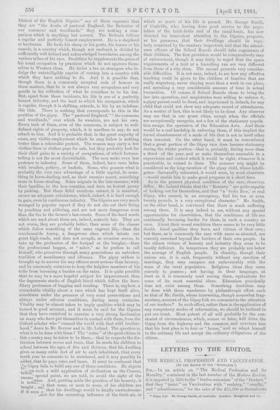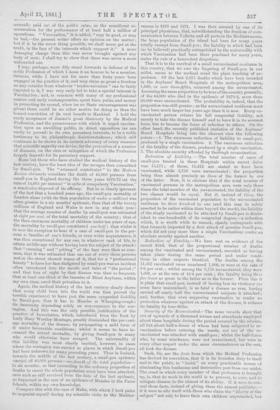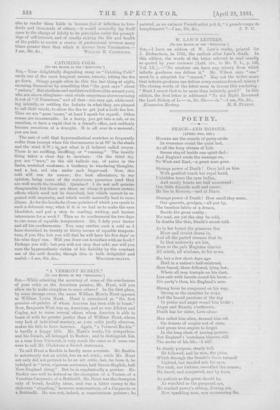LETTERS TO THE EDITOR.
THE MEDICAL PROFESSION AND VACCINATION.
[TO THE EDITOR. OF THE " SPEOTATOR.1
SIR,—In an article on " The Medical Profession and its Morality," contained in the last number of the Modena, Review, • it is imputed (p. 320) to the "trades-unionism "of the "Doctors" that they " insist " on Vaccination with " zealotry," "cruelty," and "relentlessness," for the sake of the 255,000 or thereabouts airey Life. By bloorgo Smith, of Coalvillo. London Houghton and Co.
unnually paid out of the public rates, as the munificent re- muneration for the performance of at least half a million of -operations. "Vaccination," it is added, "may be good, or may 'be bad,—the present writer offers no opinion on the matter ; bat if it be the worst thing possible, we shall never get at the !truth, in the face of the interests which support it." A more damaging charge than this was never brought against any body of men ; I shall try to show that there was never a more 'unfounded one.
I may, perhaps, more fitly stand forwards in defence of the ',noble Profession of which I deem it an honour to be a member, 'because, while I have not for more than forty years been • engaged in the practice of it, and may claim as great a freedom as auy outsider from whatever " trades-unionism " can be fairly imputed to it, I was very early led to take a special interest in
'Vaccination; and, in common with many of my professional :seniors and early contemporaries, spent time, pains, and money in promoting its spread, when (as no State encouragement was .given) there could be no other motive for doing so than the honest conviction of its vast benefit to Mankind, I hold the 'ready acceptance of Jenner's great discovery by the Medical 'Profession, and the perseverance with which it urged vaccine- -6cm upon an unwilling public, in direct opposition (as can 'easily be proved) to its own pecuniary interests, to be a noble testimony "to its philanthropic disinterestedness ; which still -continues to be shown in its earnest advocacy of every measure that scientific sagacity can devise, for the prevention of a number of diseases, on the cure or mitigation of which the Profession 'largely depends for its pecuniary support.
None but those who have studied the medical history of the last century, have the least idea of the ravages then committed 'by Small-pox. The "esteemed contributor" ta the Modern Review obviously considers the death of 44,000 persons from :small-pox in England during the three years 1870-72 (at the mate of 14,660 per annum) "in spite of compulsory Vaccination,' :a conclusive disproof of its efficacy. But he is clearly ignorant of the fact that a hundred years ago, the small-pox mortality of ,London alone (with its then population of under a million) was -often greater in a six months' epidemic, than that of the twenty millione of England and Wales is now in any whole year; that the average number of deaths by small-pox was estimated at eight per cent, of the total mortality of the country ; that of the then enormous mortality of children under ten years of age, -the mortality by small-pox constituted one-half ; that whilst it us now the exception to hear of a case of small-pox in the per- 'sons or families of one's friends, or oven wider acquaintance, it was then exceptional for any one, in whatever rank of life, to -attain middle-age without having been the subject of its attack ; -that " reaming " and " pitting" of the face were then so com- a:non, that it was estimated that one out of every three persons met in the street showed traces of it, that for a "professional 'beauty" to have her face disfigured by small-pox was an incident 'often introduced into the novels and tales of "the period ;" and that loss of sight by that disease was then so frequent, that at least one-third of the inmates of Blind Asylums, within :my own time, owed their privation to it, Again, the medical history of the last century clearly shows 'that every child born into the world was then proved (by 'terrible experience) to have just the same congenital liability :to Small-pox, that it has to Measles or 'Whooping-cough; Its immunity depending solely on non-exposure to the con- 7tagion. And this was the only possible justification of the practice of Inoculation, which, introduced from the East by Lady Mary Wortley-Montagu, greatly diminished the per-cent- • age mortality of the disease, by propagating a mild form of at under favourable conditions; whilst it seems to have in- 'creased the actual mortality, by giving Small-pox to many who would otherwise have escaped. The universality of ithis liability was most clearly marked, however, in cases -where the contagion was carried to places in which Small-pox had been unknown for many preceding years. Thus in Iceland, towards the middle of the last century, a small-pox epidemic 'carried off 40,000 persons—one-fourth of the total population— in six months; .so that (according to the ordinary proportion of deaths to cases) the whole population must have been attacked, save such as still survived from the date of the last epidemic, as happened in the case of an epidemic of Measles in the Faroe
' Islands, within my own knowledge.
Compare this with the case of Malta, with which I took pains tto aeguaintomyself 'during my scientific visits to the Mediter- ranean in 1870 and 1871. I was then assured by one of its principal physicians, that, notwithstanding the freedom of com-
munication between Valletta and all ports in the Mediterranean,
the large population of the island had been for many years totally exempt from Small-pox ; the liability to which had been (is he believed) practically extinguished by the universality with which Vaccination had been there practised for many years, under the rule of a benevolent despotism.
That it is to the survival of a small unvaccinated residuum in this country, that we owe the lingering of Smell-pox in our midst, seems to the medical mind the plain teaching of ex- perience. Of the last 2,675 deaths which have been recorded. in the Asylums' Board Hospitals of the metropolitan area,
1,660, or over three-fifths, occurred among the unvaccinated. Assuming the same proportion to be true of the country generally, of the 44,000 who died in the epidemic of 1870-2, more than 26,000 were unvaccinated. The probability is, indeed, that the proportion was still gloater; as the unvaccinated residuum must have been much larger ten years ago than it is now. Every un- vaccinated person retains his full congenital liability, not merely to take the disease himself and to have it in its severest form, but to become the focus of infection to others. On the other hand, the recently published statistics of the Asylums' Board Hospitals bring into the clearest view the following, points :-1. The enormous reduction of liability to small-pox, produced by a single vaccination. 2. The enormous reduction of the fatality of the disease, produced bay a single vaccination. 3. The absolute security afforded by thorough revaccination.
Reduction of Liability. —The total number of cases of small-pox treated in these Hospitals within recent dates was 15,171; of these, 11,412 are stated to have been vaccinated, while 3,759 were unvaccinated ; the proportion being thus almost precisely as three of the former to one of the latter. Now, it is obvious that if the total number of vaccinated persona in the metropolitan area were only three times the total number of the unvaccinated, the liability of the two classes would be equal. But if, instead of three, the proportion of the vaccinated population to the unvaccinated residuum be three hundred to one (and this may be safely asserted to be rather within than beyond the mark), the liability of the singly vaccinated to be attacked by Small-pox is dimin- ished to one-huudredth of its congenital degree,—a reduction. which, it is worth while to remark, closely corresponds with that formerly imparted by a first attack of genuine Small-pox, which did not (any more than a single Vaccination) confer an absolute security against another.
Reduction of Fatality.—We here rest on evidence of the surest kind, that of the proportional number of deaths among the vaccinated and unvaccinated, recorded as having taken place during the same period and under condi- tions in other respects identical. The deaths among the 11,412 vaccinated cases numbered 1,008, or were at the rate of 8'8 per cent.; whilst among the 3,759 unvaccivated, they were 1,689, or at the rate of 44.4 per cent, ; the fatality being thus five flaws as great in the latter as in the former. From this it is plain that small-pox, instead of having lost its virulence (as some have maintained), is as fatal a disease as ever, having carried off nearly half the unvaccinated subjects it attacked ; and, further, that even supposing vaccination to confer no protection whatever against an attack of the disease, it reduces its fatality by four-fifths.
Security of the Revaceinated.—The same records show that out of upwards of a thousand nurses and attendants employed about these hospitals during the period covered by the returns, all but about half-a-dozen of whom had been subjected to re- vaccination before entering the wards, not one of the re- vaccinated was attacked with small-pox ; whilst the half-dozen who, by some mischance, were not revaccinated, but were in every other respect under the same circumstances as the rest, all took the disease.
Such, Sir, are the facts from which the Medical Profession has derived its conviction, that it is its bounden duty to itself and to the public, to " insist " on every practicable means of eliminating this loathsome and destructive pest from our midst. The creed in which every member of that profession is brought up, is, that its work in the world is to prevent, to cure, and to mitigate disease, to the utmost of its ability. If it were to con- ceal these facts, instead of giving them the utmost publicity,— if it were to ally itself with those who claim the "liberty of the subject" not only to leave their own children unprotected, but
also to render them liable to become foci of infection to hun- dreds and thoirlands of others,—it would assuredly lay itself open to the charge of falsity to its principles under the prompt- lngs of self-interest, and of cruelly risking the life and health of filo-public to secure a source of professional revenue many times greater than that which it derives from Vaccination.—




































 Previous page
Previous page